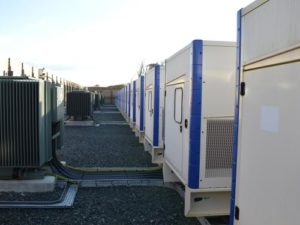Latest Emissions Legislation: MCPD and NRMM
The world of emissions legislation has changed. The introduction of the Medium Combustion Plant Directive and Non-Road Mobile Machinery regulations means compliance is essential.
The Medium Combustion Plant Directive (MCPD)
The Medium Combustion Plant Directive (MCPD) is EU legislation that became law in December 2017.
The MCPD has been brought into force across the UK through 3 different regulations:
- The Environmental Permitting (England and Wales) (Amendment) Regulations 2018.
- The Pollution Prevention and Control (Industrial Emissions) (Amendment) Regulations (Northern Ireland) 2018.
- The Pollution Prevention and Control (Scotland) Amendment Regulations 2017.
The MCP Directive (Directive (EU) 2015/2193) covers diesel engines between 1 and 50 MWth capacity. These currently fall between two other directives that cover large combustion plants and small appliances. Large combustion plants over 50 MWth are covered by the Industrial Emissions Directive (IED). Boilers, heaters and smaller appliances under 1 MWth are covered by the Ecodesign Directive (CE labelling).
EU statistics estimate there are 143,000 medium-sized combustion plants in the EU. They represent an important source of emissions of sulphur dioxide (SO2), nitrogen oxides (NOx) and dust. The MCP Directive regulates emissions of all three and monitors emissions of carbon monoxide (CO) with the sole aim of reducing these harmful substances that are known to be hazardous to human health as well as the environment.
The MCP Directive is the latest instrument to ensure the EU’s implementation of the Gothenburg Protocol under the UNECE Convention on Long-Range Transboundary Air Pollution.
The MCPD was enacted by the EU on 18 December 2015. Plants that come into operation after 20 December 2018 are classified as “new plant” in the MCP Directive; its emissions limit values (ELVs) apply as soon as the plants start operating. Older plants are classified as “existing plants” by the Medium Combustion Plant Directive. They have to conform to the MCP Directive’s ELVs by 2025 or 2030, depending on their size.
If the Medium Combustion Plant Directive is going to affect me, what’s next?
IPU have a range of solutions that can be specified according to your application. These include Selective Catalytic Reduction systems (SCRs) and Diesel Particulate Filters (DPFs).
Non-Road Mobile Machinery regulations
The NRMM is EU regulation to control emissions from engines not used on public roadways, including off-road vehicles such as construction and railway vehicles. Mobile generator sets are also included.
Non-road mobile machinery is identified as a major contributor to poor air quality in densely populated cities such as London.
Particular focus is being placed on the following emission types under the NRMM regulations: NOx, PM, Carbon Monoxide and Hydrocarbons (unburnt fuel).
Whilst generator sets that are permanently installed to a site are exempt from NRMM, trailer mounted sets, rental sets of any size and any other set that is not permanently installed will need to comply with this regulation. Engines <19 kW and >560 kW fall under the non-road mobile machinery regulation.
Non-road mobile machinery will be unable to operate in London’s Ultra-Low emissions zone and other cities operating a clean air zone without being compliant to emissions regulations. Existing NRMM must now be retrofitted with emissions abatement technologies.
In general, the emissions levels in the NRMM differ from those in the MCPD:
- The NOx limit is 10.4g/kWh.
- The limit for particulate matter is 0.025g/kWh.
- The Carbon Monoxide (CO) limit is 3.5g/kWh.
- Finally, the limit on hydrocarbons is set at 0.19g/kWh.
IPU emissions solution will ensure compliance to NRMM as well as the MCP Directive.

